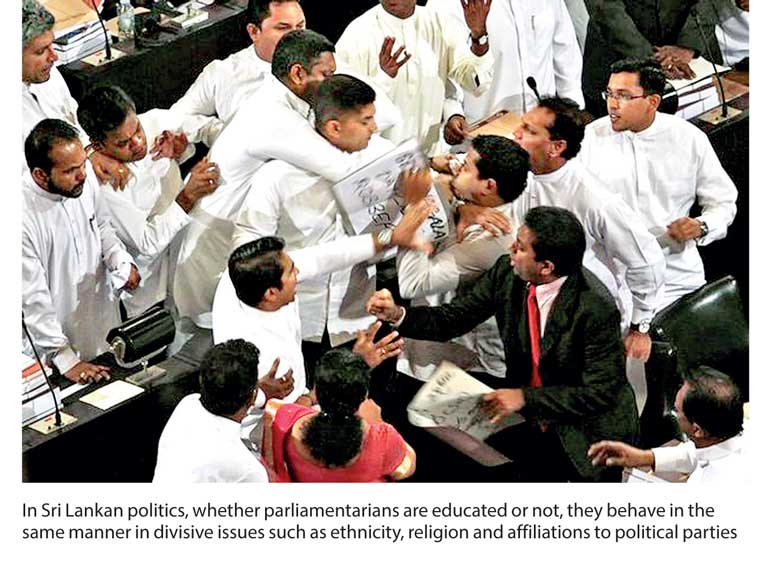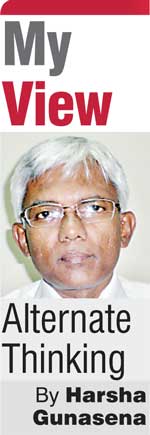Friday Feb 27, 2026
Friday Feb 27, 2026
Friday, 9 March 2018 00:10 - - {{hitsCtrl.values.hits}}

 Member of Parliament M.A. Sumanthiran was a panellist at the Panel Discussion on ‘Mindfulness in Policy Making, Governance and Diplomacy’ on day two (25 February) of the Global Mindfulness Summit 2018 held at the Sri Lanka Foundation Institute.
Member of Parliament M.A. Sumanthiran was a panellist at the Panel Discussion on ‘Mindfulness in Policy Making, Governance and Diplomacy’ on day two (25 February) of the Global Mindfulness Summit 2018 held at the Sri Lanka Foundation Institute.
He added colour to the panel discussion and said he would reveal a secret. It was announced sometime ago that for a period of one hour of every day, there would be a live streaming of the sessions of Parliament. This was a precursor to the current unrestricted live streaming of the parliamentary sessions.
The audience expected that the MP would say that all the MPs behaved nicely during the said period and they would have started the normal behaviour after that. To our astonishment he said what happened was completely the opposite. MPs behaved very badly and accused each other during that period of one hour and their behaviour was calm after that. He said they were playing to the gallery and if the gallery thinks that listening is better than fighting, they will listen.
Prior to the summit, we visited Parliament twice on behalf of the ‘Sati Pasala Foundation’ which organised the summit. We conducted a practical session of mindfulness for the parliamentary staff and on the second occasion, a session was conducted for the parliamentarians. We had the patronage of the Speaker on both occasions. Whenever we announced in the previous sessions conducted to various parties that we would be going to the Parliament to conduct a session, all of them laughed. It was a common experience we encountered.
This was a part of the gallery the MP was talking about. It may or may not be a representative sample. So why is there this duality of the general public? Is this the reality or only an incorrect perception of parliamentarians?
When the MP further explained at the summit that at the Committee stages, MPs are not aggressive and in fact, they tend to forget their affiliations to the political parties, he got a round of heart-felt applause from the audience. He joked that he would like to see that the committee proceedings would not be live streamed.
This is evident when one considers the behaviour of MPs during the proceedings of six sub-committees that cover the areas of fundamental rights, judiciary, law and order, public finance, public service and centre-periphery relations to assist the Steering Committee of the Constitutional Assembly to draft a new constitution.
Those sub-committees were headed by Mahinda Samarasinghe, Rauff Hakeem, Sagala Ratnayaka, Bandula Gunawardana, Susil Premajayantha and Dharmalingam Sithadthen respectively. They have different political affiliations and all the parties represented in the parliament were represented in those committees, including the Joint Opposition. The reports of these sub-committees were published and were available on the web but there was insufficient public debate on those reports.
Rajitha Ratnayake has written an article to Ravaya newspaper on 25 February stating the following opinion in respect of local government elections: “According to the data and information we obtained, Buddhist clergy and the leaders of Sri Lanka Podujana Peramuma created a public opinion based on race and religion that Sinhala Buddhists should come forward to protect themselves and their war heroes and defeat the attempt of bringing a federal constitution by voting for SLPP.” Based on his research, this ideology influenced approximately 68% to the total outcome.
This ideology, if correct, does not match with the behaviour of the parliamentarians of the Joint Opposition at the sub-committees of the Steering Committee of the Constitutional Assembly. Once again, there is a duality.
The recent political history of Sri Lanka illustrates this duality. When the ruling party tries to bring a solution to ethnic/religious issues, the Opposition party counters it. When that very same Opposition party comes into power and tries to bring about a solution to the same ethnic/religious question, the current opposition, which was the previous ruling party, opposes it.
My observation of Sri Lankan politics is that, whether parliamentarians are educated or not, they behave in the same manner in divisive issues such as ethnicity, religion and affiliations to political parties. Both the majority and the minority parties are equally obsessed with their own race and religion and therefore have no capacity to perceive the importance of the nation and the country to which we all belong.
Although the behaviour of listening and discussing is advocated and admired by the conscious mind, the subconscious mind demands the advancement of one’s respective subsets – whether it is political party, ethnicity or religion. This is one reason why people like their representatives to unleash verbal attacks on their opponents. In order to get votes, parliamentarians perform without realising that the very people they want to please do not consciously approve their behaviour.
This may be the same in relation to the problems we face in ethnic and religious harmony. If appropriate discussions can be initiated, conscientious people can be convinced to resolve those issues in an amenable manner.
There are some nations that have addressed these complicated issues of ethnicity and religion successfully. India, during their struggle for independence, brought all its communities under one banner. This rich heritage is now being gradually reversed, knowingly or unknowingly, by the present Indian administration.
Mahatma Gandhi conducted his last hunger strike demanding the rights of the Muslims. Nelson Mandela, after becoming the President of South Africa, insisted on harmony between the members of the previous apartheid regime and the new South African Government – amidst stiff resistance by his own political party – for the sake of the future of South Africa.
Committed and strong political leadership is a must for this type of exercise. Leaders should lead rather than allowing them to be led by the general public. Maybe mindfulness can provide the necessary glue in this endeavour.